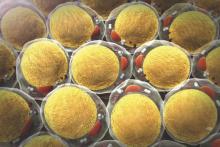Bisphenol S (BPS), commonly used as a “safe” substitute for bisphenol A (BPA) in the manufacturing of plastics and other consumer products, induces lipid accumulation in, and differentiation of, human preadipocytes, indicating that it may have adverse effects on the endocrine system, according to a report published online March 22 in Endocrinology.
The findings suggest that BPS is not a harmless substitute for BPA and that more thorough toxicologic and epidemiologic studies are warranted regarding its effects on human health, said Jonathan G. Boucher and his associates at the Environmental Health Science and Research Bureau, Health Canada, Ottawa.
BPS is a close analogue of BPA and has been detected in many products, including paper receipts, canned foods and drinks, epoxy resins, and baby bottles, as well as in environmental samples such as indoor dust. It is known to exhibit estrogenic activity and was suspected of involvement in lipid processes that also entail hormonal cues from glucocorticoids and insulin.
In a series of laboratory analyses, the investigators examined the effects of BPS on primary human preadipocytes harvested from the hips, thighs, and abdomens of normal-weight female donors aged 25-57 years. They confirmed that BPS has estrogenic effects. They also reported for the first time that, “similar to BPA, BPS increases adipogenesis in human preadipocytes” by almost twofold and induces adipocyte differentiation, primarily by activating the adipogenic transcription factor PPARG (peroxisome proliferator-activated receptor-gamma).
“Further study is required to better understand potential hazards of widespread BPS exposure. The few reports available now indicate that BPS can affect endocrine function, as demonstrated by studies showing decreased testosterone, androstenedione, and cortisol levels in ex vivo and in vitro models,” the investigators noted (Endocrinol. 2016 Mar 22. doi:10.1210/en.2015-1872) .


